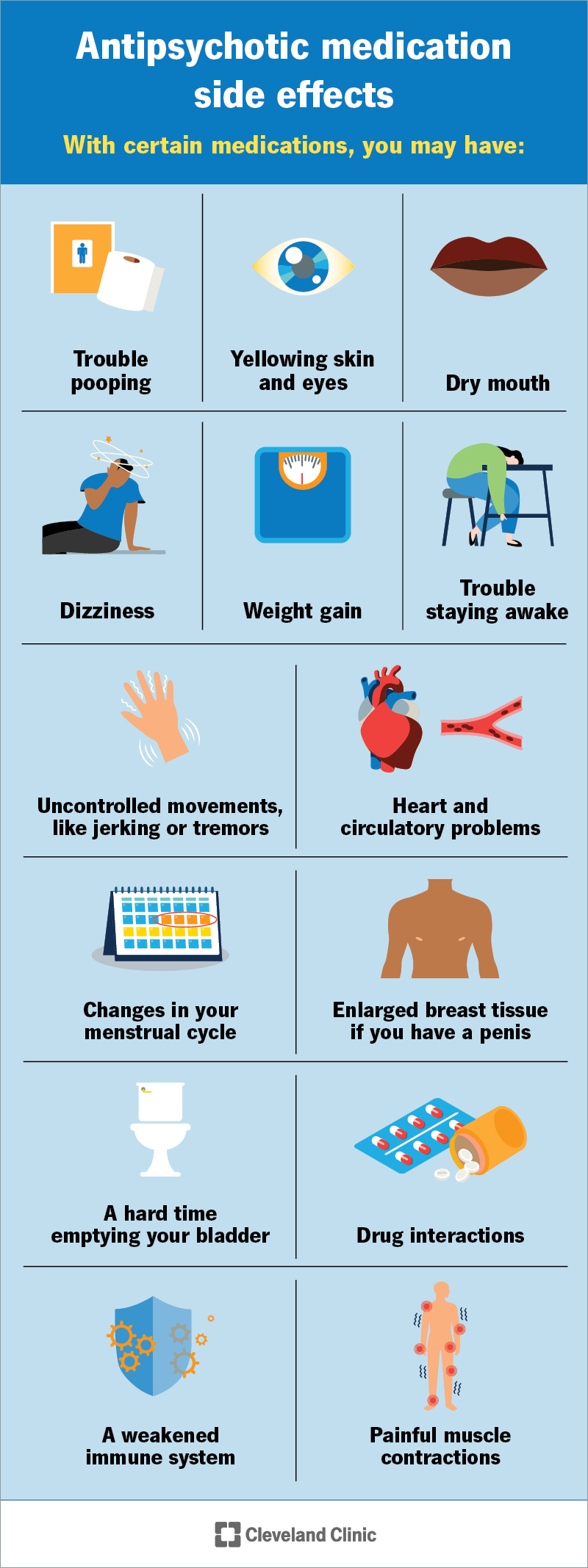Antipsychotic drugs treat psychosis, a collection of symptoms that affect your ability to tell what’s real and what isn’t. These drugs are a critical part of treating conditions that involve psychosis. Without them, many of these conditions are so disruptive or severe that they need 24/7 psychiatric care.
Advertisement
Cleveland Clinic is a non-profit academic medical center. Advertising on our site helps support our mission. We do not endorse non-Cleveland Clinic products or services. Policy

Image content: This image is available to view online.
View image online (https://my.clevelandclinic.org/-/scassets/images/org/health/articles/antipsychotic-medications)
Antipsychotic medications are drugs that mainly treat psychosis-related conditions and symptoms. But taking an antipsychotic drug doesn’t always mean you have a symptom or condition related to psychosis. That’s because these drugs are very important for treating other conditions, too.
Advertisement
Cleveland Clinic is a non-profit academic medical center. Advertising on our site helps support our mission. We do not endorse non-Cleveland Clinic products or services. Policy
Antipsychotics work by changing how certain signals in your brain — called neurotransmitters — affect how you feel and act. If these chemicals are out of balance, you may develop symptoms of psychosis like hallucinations and delusions. Scientists are still learning exactly how antipsychotics help. But by changing the balance of the chemicals in your brain, you may start to have fewer symptoms.
There are three main types of antipsychotic medications:
First-generation antipsychotics
These block the way your brain uses several neurotransmitters, especially dopamine. They also block acetylcholine, histamine and norepinephrine from latching onto various receptors.
Second-generation antipsychotics
These medications block receptors like serotonin and dopamine. And they activate other serotonin and dopamine receptors.
Next-generation antipsychotic
This new medication targets psychosis differently. Xanomeline and trospium chloride (Cobenfy™) don’t affect dopamine, so it has no impact on motor function and won’t make you sleepy. It attaches to specific acetylcholine receptors that are only in your brain and affect memory and cognition. In clinical trials, it reduced schizophrenia symptoms. And it had fewer unpleasant side effects than traditional antipsychotics.
Advertisement
First-generation (typical) antipsychotics
Second-generation (atypical) antipsychotics
Next-generation antipsychotic
Antipsychotics treat mood disorders, including:
Providers may treat other conditions with antipsychotics, but those drugs aren’t their main treatment. These conditions include:
Antipsychotic medications have several benefits, including:
Advertisement
Antipsychotics are useful, but there are possible drawbacks. Antipsychotic medications can have various side effects and complications, including:
Some antipsychotic medications are for short-term use only. Others, you can take for years. It depends on what medication you take, why you take it and much more. Your healthcare provider is the best person to tell you how long to take one of these medications.
Call your healthcare provider as soon as possible if you develop any of the following:
If you feel like you or someone you know is in danger of self-harm or suicide, dial 988 for the National Suicide and Crisis Lifeline. Outside the United States, call your local emergency services number.
The most commonly prescribed first-generation antipsychotic drugs are:
Advertisement
The most commonly prescribed second-generation antipsychotics are:
Psychosis symptoms can happen with many conditions. They affect your understanding of what’s real and what isn’t. They can be severe and disruptive. Antipsychotics are key to treating these symptoms. Sometimes, the benefits are worth the side effects. But your healthcare provider will talk to you about what’s best in your case. Bring a journal of your symptoms, medications, supplements and side effects to every appointment. This may help your care team make sure you’re on the right medications, at the right doses.
Advertisement

Sign up for our Health Essentials emails for expert guidance on nutrition, fitness, sleep, skin care and more.
Learn more about the Health Library and our editorial process.
Cleveland Clinic’s health articles are based on evidence-backed information and review by medical professionals to ensure accuracy, reliability and up-to-date clinical standards.
Cleveland Clinic’s health articles are based on evidence-backed information and review by medical professionals to ensure accuracy, reliability and up-to-date clinical standards.
Your mental well-being is just as important as your physical well-being. Cleveland Clinic’s mental health experts can help you live life to the fullest.
